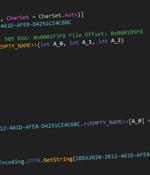Security News

Operators of the StrRAT and Ratty remote access trojans are running a new campaign using polyglot MSI/JAR and CAB/JAR files to evade detection from security tools. Polyglot files combine two or more file formats in a way that makes it possible for them to be interpreted and launched by multiple different applications without error.

A type of cryptomining malware targeting Linux-based systems has added capabilities by incorporating an open source remote access trojan called Chaos RAT with several advanced functions that bad guys can use to control remote operating systems. Like earlier, similar versions of the miner that also target Linux operating systems, the code kills competing malware and resources that affect cryptocurrency mining performance.

The threat actor behind the RomCom RAT has refreshed its attack vector and is now abusing well-known software brands for distribution. In a new campaign discovered by BlackBerry, the RomCom threat actors were found creating websites that clone official download portals for SolarWinds Network Performance Monitor, KeePass password manager, and PDF Reader Pro, essentially disguising the malware as legitimate programs.

The operators of RomCom RAT are continuing to evolve their campaigns with rogue versions of software such as SolarWinds Network Performance Monitor, KeePass password manager, and PDF Reader Pro. Targets of the operation consist of victims in Ukraine and select English-speaking countries like the U.K. "Given the geography of the targets and the current geopolitical situation, it's unlikely that the RomCom RAT threat actor is cybercrime-motivated," the BlackBerry Threat Research and Intelligence Team said in a new analysis.

The threat actor behind a remote access trojan called RomCom RAT has been observed targeting Ukrainian military institutions as part of a new spear-phishing campaign that commenced on October 21, 2022. "Once the victim installs a Trojanized bundle, it drops RomCom RAT to the system."

Quantum Builder lets attackers to create malicious Microsoft Windows LNK shortcuts. Quantum Builder has been linked to the advanced persistent threat gang Lazarus Group, based on shared tactics, techniques, and procedures and overlaps in source code, but they can't with any confidence attribute the current campaign to Lazarus or any particular threat group.

A threat actor tracked under the moniker Webworm has been linked to bespoke Windows-based remote access trojans, some of which are said to be in pre-deployment or testing phases. "The group has developed customized versions of three older remote access trojans, including Trochilus RAT, Gh0st RAT, and 9002 RAT," the Symantec Threat Hunter team, part of Broadcom Software, said in a report shared with The Hacker News.

Palo Alto Networks Unit 42 has detailed the inner workings of a malware called OriginLogger, which has been touted as a successor to the widely used information stealer and remote access trojan known as Agent Tesla. A.NET based keylogger and remote access, Agent Tesla has had a long-standing presence in the threat landscape, allowing malicious actors to gain remote access to targeted systems and beacon sensitive information to an actor-controlled domain.

Borat RAT malware goes beyond the standard features and enables threat actors to deploy ransomware and DDoS attacks. Borat RAT is a unique and powerful combination of RAT, spyware, and ransomware capabilities fused into a single malware.

Threat actors associated with the Cuba ransomware have been linked to previously undocumented tactics, techniques and procedures, including a new remote access trojan called ROMCOM RAT on compromised systems. In the intervening months, the ransomware operation has received an upgrade with an aim to "Optimize its execution, minimize unintended system behavior, and provide technical support to the ransomware victims if they choose to negotiate," per Trend Micro.